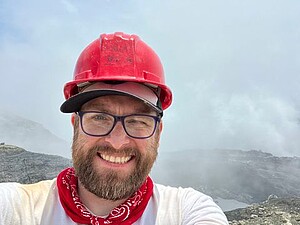Publication date: 07/11/23
ThemesNews Headline news
The ROTTnROCK project by Michael Heap, teacher-researcher at the Institut Terre et Environnement de Strasbourg (University of Strasbourg/CNRS /Engees) is the winner of an ERC Synergy grants 2023. The aim of the project is to understand the phenomena inside active volcanoes in order to anticipate risks.
Involving several foreign partners (Germany, Sweden, Ireland), this project is to assess the role of hydrothermal alteration on the morphology, instability and unpredictable volcanic hazards of volcanoes. This grant of almost 10 million euros will enable the four partner institutions to invest heavily in cutting-edge infrastructure and hire nine post-docs and eight PhD students.
Over 10% of the world's population is exposed to the direct effects of volcanic eruptions. Volcano monitoring aims to detect and correctly interpret volcanic hazard signals, and provide early and accurate warnings of impending eruptions. Yet, despite technical and scientific advances, volcanoes continue to produce unexpected explosive eruptions or sudden collapses of their flanks. Every year, these unpredictable events lead to volcanic disasters that devastate unprepared communities and destroy unprotected infrastructure. Previous work by the ROTTnROCK team indicates that volcanic hazards are due to hydrothermal alteration. This gradually and imperceptibly alters the chemical and physical state of the rocks inside a volcano, creating a soft, unstable interior. However, the link between "soft" volcanoes and unpredictable volcanic events remains enigmatic.
The ROTTnROCK project aims to advance our understanding of the hydrothermal weathering processes that occur within active volcanic systems. Specifically, the ROTTnROCK project will identify where and at what scale weathering occurs, explore the chemical fingerprint of weathering and its effects on rock properties and strength using laboratory methods, and develop 4D (4-dimensional) simulations of volcano stability which will provide an innovative and optimized workflow for volcanic risk assessment. To achieve this, the project combines several innovative approaches from traditionally distinct geoscientific disciplines: remote sensing, mineralogy, chemistry, rock mechanics and computer modeling. ROTTnROCK will revolutionize understanding of hydrothermal weathering and how it shapes volcanic hazards, paving the way for strategies to predict and mitigate unexpected volcanic events caused by hydrothermal weathering, and helping to avert disasters on volcanoes worldwide.
This six-year ERC grant, worth 9,989,653 euros, will be used to develop and extend the experimental platform at the Institut Terre et Environnement de Strasbourg - ITES (University of Strasbourg/CNRS /Engees), and to set up a team of three post-docs. This ERC, which also involves several foreign partners such as the German Center for Geosciences Research (Helmholtz Center Potsdam, GFZ, Germany), Uppsala University (Sweden) and University College Dublin (Ireland), will enable them to invest massively in cutting-edge infrastructure (new remote sensing equipment, the development of "weathering laboratories" and new high-performance computing capabilities). In all, the project will involve nine post-docs and eight PhD students at the four institutions.
"I am absolutely thrilled to receive this scholarship! I'm looking forward to spending the next six years, and beyond, focusing on understanding a subject of great interest to me and my partners. I can't wait to start this new phase!" reacted Michael Heap.
















